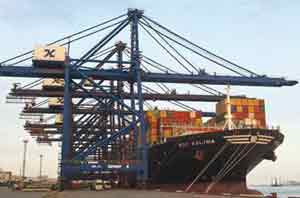US official calls for more dialogue with China
Updated: 2011-10-25 10:33
By Cheng Guangjin (China Daily)
|
|||||||||
COLLEGE STATION, TEXAS - A United States State Department official wants to improve dialogue with China on Monday at a critical time when the two countries are facing a potential trade war.
US Deputy Secretary of State William Burns, the highest ranked foreign service officer in the US, will arrive in Beijing on Thursday. His trip is among a number of visits within the last month by US officials to China during a time of tension between the two nations.
"History teaches that moments of great change are when the dangers of misunderstanding, miscalculation or inadvertent conflict are greatest," Burns said in a luncheon at the 5th China-US Relations Conference, held recently at Texas A&M University in College Station.
"In other words, we will increasingly live in a world where America and China cannot afford the luxury of quietly operating in parallel," he said.
Burns explored what's in store for the US and China as they navigate what he described as a "period of extraordinary dynamism and change".
According to a State Department news release, Burns will meet with senior officials in Beijing.
In his luncheon speech, Burns talked about areas where China and the US have cooperated, such as the denuclearization of the Korean Peninsula, but also points of disagreement, including intellectual property rights, tension over the South China Sea and the appreciation of China's currency.
"As our relationship evolves we must continue to take steps to address the most competitive elements in our relationship in the space, cyber, nuclear and maritime arenas," he said.
"Enhancing transparency in these areas is essential to the long-term stability of our relationship," he told an audience of Chinese and US officials, business executives and scholars.
Burns said there will be enormous challenges for the two countries for many years to come.
"A narrow focusing on areas of agreement is not enough given the challenges we are facing together," he said. "We have to dive into the difficult cases as well."
Burns said the US has increased engagement with China, which has set a "positive tone".
The US has sent a number of top officials to China in the last month as relations have cooled following the US' September announcement that it will help upgrade Taiwan's fighter jets and the passage of a bill by the US Senate this month that threatens to punish China for its currency exchange rate.
US National Security Advisor Thomas Donilon is scheduled to visit China from Oct 22-24, Foreign Ministry spokesman Liu Weimin announced last week.
Kurt Campbell, US assistant secretary of state for East Asian and Pacific Affairs, was in Beijing earlier this month for a second series of talks on Asia-Pacific affairs, co-chaired by Vice Foreign Minister Cui Tiankai.
Prior to the passage of the US Senate currency bill, US Under Secretary of Treasury Department Lael Brainard visited Beijing at the end of September, and a number of US governors were in China last week to explore trade opportunities.
"If we want to avoid misunderstandings and prevent crises before they emerge, then communication, transparency and trust will be essential. We must find tangible ways to deepen all three," Burns said.
Chinese Ambassador to the US Zhang Yesui said in a recent speech that it is imperative that the two countries understand each other's strategies, intentions and political objectives.
"We need close dialogues and communications in order to build strategic trust and avoid miscalculations and misperceptions," Zhang said, describing the Sino-US relationship as one of the most complex bilateral relationships in the world.
Many Chinese analysts said the visits to China by US officials are paving the way for a November meeting between President Hu Jintao and US President Barack Obama.
Hu and Obama have met nine times since Obama's first visit to China in 2009, and there will be three more meetings between them in November during the G20 summit in France, APEC in Hawaii and the East Asia Summit in Indonesia.
China Daily
(China Daily 10/25/2011 page2)











